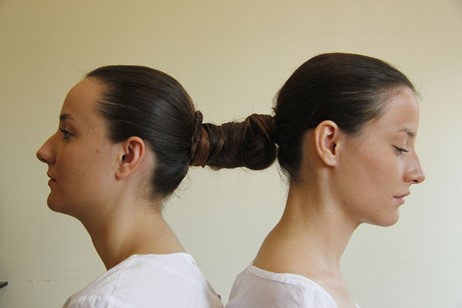Separating Together
Often, twins who recognize they need a therapist’s help to navigate treacherous emotional terrain can present with an extensive list of grievances about hostile, destructive, and mean behaviors. Usually, one twin in particular acts out by stealing away a best friend or romantic partner, sabotaging the completion of school or work projects, or refusing to share supplies or physical space.

However, my conjoint treatment of a pair of twenty-one-year-old identical twins, whom I will call Casey and Francine, reveals no conscious anger; to the contrary, they are committed to helping each other separate and individuate. Both young women desperately desire to escape from their enmeshment. They are frightened by their lagging social and emotional development, which has been stymied by their unhealthy connection. While they love one another deeply, they astutely realize that their lives must change. They recognize that they need professional intervention and guidance to escape from a twin vortex that renders them fearful and paralyzed.
The girls describe an endless, compulsive cycle of misery and anxiety that began in high school and lasted through their college years. They had no awareness about their inability to self-regulate; they could only mutually regulate one another.
One recurring scenario in their dynamic played out as follows: Casey finished writing a paper. She saw that Francine was struggling and becoming increasingly frustrated. Francine began to cry. Casey could not feel accomplished or pleased with the job she did because she was overwhelmingly anxious about Francine’s paralysis and fears. Casey dropped everything to come to Francine’s rescue. Casey ended up writing the paper for Francine because she was inconsolable and distraught.
At the end of these episodes, neither twin was satisfied. Both described the experience as a shared frenzy that left them feeling empty, alone, and desperate. They were unable to enjoy their identical course of study because they were always in the same classes and working on shared projects. Both hated attending their university because all they did was study. Casey and Francine did acknowledge in retrospect that they hid behind a drive for academic success to rationalize avoiding social situations where they felt inept, out of place, and immature. They were too anxious to do activities with anyone else because their obsession with schoolwork left them no leisure time. They did not make friends or attend any social events. They shared a room and ate meals by themselves.
As I continue to work with them and they slowly individuate, I doubt Francine and Casey will develop that hostile, competitive edge that many other twin pairs experience before realizing how much they long for separate identities. Both are optimistic that I will help them navigate their own individual paths. They seem to feel an almost parental love for one another. Consequently, one will make conscious sacrifices and compromises for the well-being of the other. While taking the highroad for the welfare of the other is a noble act, they will eventually need to address their individual expressions of ambivalence and disappointment as they move away from one another emotionally and confront the inequities they formerly avoided.
Image courtesy of Genco Gulan on Wikimedia Commons (CC BY-SA 3.0)


I agree individuating for twins is their biggest hurdle and often requires professional help to avoid the negative feelings that so often cause distress
Great post and being an identical twin (now in my 30’s) I can sympathize. At 21 I had a really hard time balancing the compulsive cycle of anxiety and anger that plagued us throughout school. We went to multiple different grade schools and eventually college together. We had no tools or basic understanding of how to self regulate emotions, we could only regulate as one – often times it would be in the form of “us vs. everyone else.” I even passed on going to an Ivy league school to stay with my twin.
I applaud and think it’s really mature that both Casey/Francine have acknowledged needing professional help together.
Dear Roger,
I so appreciate your comments. It is validating for me to know that others can relate to what I am writing about and acknowledge the help and guidance I am working to
give my patients.
Best wishes,
Dr. Friedman